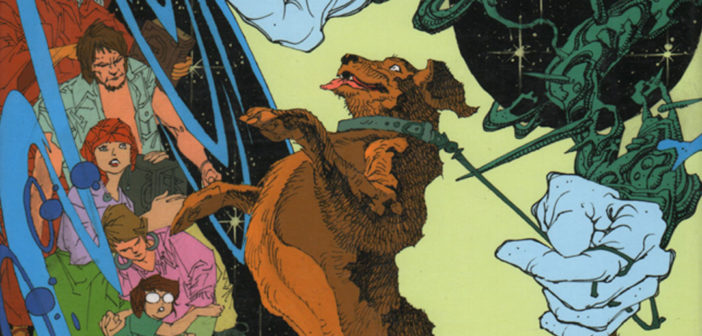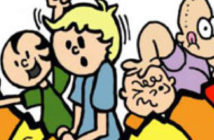The philosopher Diogenes of Sinope consulted the Oracle of Delphi in order to discover his purpose in life. She told him: “deface the currency.” But Diogenes didn’t interpret this as destroying money, but rather challenging the common, ordinary perception of life, specifically norms and customs. He dwelled in a large barrel instead of a house. He destroyed his only wooden bowl out of solidarity when he witnessed a beggar boy drinking water from his cupped hands. And he famously patrolled the streets of Athens with a lantern in broad daylight, searching for just one honest man.
All of this eventually led to his nickname of “Diogenes the Dog.” But historical records claim that the philosopher took the term as a mantle rather than a slander, for dogs are not pretentious. They eat, dwell, defecate, and copulate in public without any shame. And most importantly, dogs have and instinct for knowing friends from foes. Diogenes always felt that we could learn a thing or two from dogs because their more virtuous than man could ever dream to be.
At the opening of the first volume of God the Dyslexic Dog, the creation of time and space takes place. A wandering vagrant-poet is responsible. Perhaps he’s God, and perhaps not. Maybe he’s just the cosmos anthropomorphized. He wears tattered robes, a wide-brimmed hat, and is grizzled. He looks a little bit like Odin and Gandalf the Grey, but he has the spirit of Diogenes. Why do I say this? Because for every action there is an equal and opposite reaction, and when the celestial poet gives life to the cosmos, he creates an inversion—the Dog.
This is our world, but it’s still primordially psychedelic. I’ve referenced the substance Dimethyltryptamine (DMT) in past writings: it is a powerful hallucinogen that occurs naturally in human biology. Its effects when ingested are drastic; they’re said to transport the mind of the user into a parallel universe beyond tangible conception. As one unknown source one said about the psychedelic: “Load universe into cannon. Point at brain. Fire.” This is the only way I can describe the appearance of God the Dyslexic Dog.
This is intended to be the highest of compliments, because Philip and Brian Phillipson, the creators and writers of the series, have crafted extraordinary interpretations of world myth and legends. Their work here isn’t unlike the mystical challenges postulated by Neil Gaiman in The Sandman, Alan Moore in Promethea, or Grant Morrison in The Invisibles. I say this because after the vagrant creates the universe and his dog as its inverse, he lets the chips fall where they may. Gods come into being, all the gods we know about from our history lessons in school. And the world comes into being, too, with humans to worship the gods.
All of these elements were ordered by the vagrant-poet into a box, which was given to the mortal Pandora for protection. So long as the gods existed in the box, their roles as idols of the human imagination would remain safe. But this is not to the liking of Bacchus, the Roman deity of wine and the frenzy. Like a destructive alcoholic who appears to be the life of the party but is actually filled with pain and suffering, he wants to open the box to set the gods loose in the hope that it will bring his own existence to an end. If the world’s deities are no longer contained inside Pandora’s chest, then they no longer have a purpose in the world’s collective unconscious. Order is lost to chaos.
An epic quest ensues that spans time and space. Pandora and a young boy named Nez must find the salvation of creation: the Dog. He is the only one who has the ability to face and destroy the now-renegade gods that are only interested in dominating the world they once inspired.
I apologize if this seems confusing, but I promise that the plot comes together rather concisely as the first volume of God unfolds. This is a feat, because the narrative is quite dense with a lot of material I neglected to touch upon. The main reason why I am so attracted to the story and themes of God the Dyslexic Dog is because it doesn’t assign judgments of what beliefs are right and what ones are wrong.
It’s not a secret that I am no friend of religion. Add to this the fact that the Phillipsons have created a new deity around scientific theory and progress called “Dar Win.” While I don’t agree with the premise that science is something to be worshiped instead of religion (science is a process of objective discovery outside of faith—that is all), their story doesn’t proselytize. Rather, they set up a grippingly unique epic unlike anything I’ve ever seen in a comic book.
When looking at the breathtaking illustrations of artist Alex Nino and the colors of Dennis Venizelos, I am instantly reminded of the collaborative works of Frank Miller and Lynn Varley. Nino, a long-time veteran of comics himself, combines the appearance of grizzled and rough characters with fine-lined details that is only possible in a comic book. He undertakes incredibly elaborate interiors in this book, and they are all a grand success in conjunction with Venizelos’ colors.
This is the first in three trades. While I don’t have the other two on hand, I will set out to purchase them soon enough. It’s a story that’s so attractive because of the bombastic courage of its imagination. The book takes a lot of chances, which is applause-worthy in its own right. But when those chances prove successful, well, it’s all the sweeter. God the Dyslexic Dog is a celebration of dog as man’s best friend, but it’s also an inquiry into why he’s our pal and ally.
I think Diogenes would have enjoyed a book like this.
This comic book review originally appeared on Broken Frontier.




